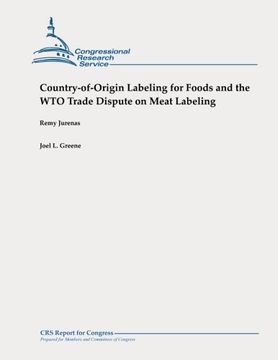Country-Of-Origin Labeling for Foods and the wto Trade Dispute on Meat Labeling (en Inglés)
Reseña del libro "Country-Of-Origin Labeling for Foods and the wto Trade Dispute on Meat Labeling (en Inglés)"
Most retail food stores are now required to inform consumers about the country of origin of fresh fruits and vegetables, fish, shellfish, peanuts, pecans, macadamia nuts, ginseng, and ground and muscle cuts of beef, pork, lamb, chicken, and goat. The rules are required by the 2002 farm bill (P.L. 107-171) as amended by the 2008 farm bill (P.L. 110-246). Other U.S. laws have required such labeling, but only for imported food products already pre-packaged for consumers. The final rule to implement COOL took effect on March 16, 2009. Both the authorization and implementation of country-of-origin labeling (COOL) by the U.S. Department of Agriculture’s Agricultural Marketing Service have been controversial. Much attention has focused on the labeling rules that now apply to meat and meat products. A number of livestock and food industry groups continue to oppose COOL as costly and unnecessary. They and the main livestock exporters to the United States—Canada and Mexico—view the requirement as trade-distorting. Others, including some cattle and consumer groups, maintain that Americans want and deserve to know the origin of their foods, and point out that many U.S. trading partners have their own import labeling requirements. Less than one year after the COOL rules took effect, Canada and Mexico used the World Trade Organization’s (WTO’s) trade dispute resolution process to challenge some features that apply to labeling meat. Both countries argued that COOL has a trade-distorting impact by reducing the value and number of cattle and hogs shipped to the U.S. market. For this reason, they argued that COOL violates WTO trade commitments agreed to by the United States. On November 18, 2011, a WTO dispute settlement (DS) panel found that (1) COOL treats imported livestock less favorably than like U.S. livestock (particularly in the labeling of beef and pork muscle cuts), and (2) COOL does not meet its objective to provide complete information to consumers on the origin of meat products. The panel reached these conclusions by examining the economic effects of the measures taken by U.S. livestock producers and meat processors to implement COOL, and by accepting arguments that the way meat is labeled to indicate where the multiple steps of livestock birth, raising, and slaughtering occurred is confusing. On March 23, 2012, the United States appealed the panel report to the WTO Appellate Body (AB). On June 29, 2012, the AB upheld the DS panel’s finding that the COOL measure treats imported Canadian cattle and hogs, and imported Mexican cattle, less favorably than like domestic livestock, because of its record-keeping and verification requirements. The AB, however, reversed the panel’s finding that COOL does not fulfill its legitimate objective to provide consumers with information on origin. The Obama Administration welcomed the AB’s affirmation of the U.S. right to adopt labeling requirements to inform consumers on the origin of the meat they purchase, but did not signal what steps might be considered to address the ‘less favorable treatment’ finding. Participants in the U.S. livestock sector had mixed reactions, reflecting the heated debate on COOL that occurred over the last decade. Two consumer groups expressed concern that this WTO decision further undermines U.S. consumer protections. If the United States decides to bring COOL into compliance with the AB finding, WTO rules call for that to occur within a reasonable period of time. Options would be to consider regulatory and/or statutory changes to the COOL regulations and/or law. If the United States does not comply, Canada and Mexico would have the right to seek compensation or retaliate against imports from the United States.

